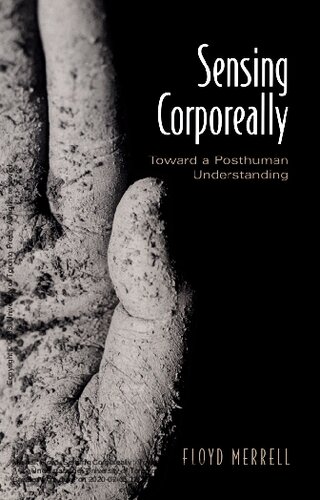

Most ebook files are in PDF format, so you can easily read them using various software such as Foxit Reader or directly on the Google Chrome browser.
Some ebook files are released by publishers in other formats such as .awz, .mobi, .epub, .fb2, etc. You may need to install specific software to read these formats on mobile/PC, such as Calibre.
Please read the tutorial at this link: https://ebookbell.com/faq
We offer FREE conversion to the popular formats you request; however, this may take some time. Therefore, right after payment, please email us, and we will try to provide the service as quickly as possible.
For some exceptional file formats or broken links (if any), please refrain from opening any disputes. Instead, email us first, and we will try to assist within a maximum of 6 hours.
EbookBell Team

0.0
0 reviewsIn Sensing Corporeally, Floyd Merrell argues that human sensation and cognition should be thought of in terms of continually changing signs that can be accounted for in terms of topological forms. Focusing on qualitative and analogical sensing, rather than quantitative and digital reasoning, Merrell begins by reflecting on the concept of consciousness as developed by neurologist Antonio Damasio, whose work in turn reflects Charles Peirce's conception of the sign. By expanding Peirce's notion of the sign in light of Damasio's work, as well as that of Oliver Sacks and the Argentine fabulist Jorge Luis Borges, Merrell demonstrates the importance of the relationship between cognition, consciousness, and fantasy. The philosophy of science espoused by Michael Polanyi, and the analytic and postanalytic philosophies of Donald Davidson, Nelson Goodman, Hilary Putnam, and Richard Rorty are also explored in light of what they bring to Peircean concepts of vagueness and generality, inconsistency and incompleteness, and abduction, induction, and deduction. Merrell concludes by moving to the conceptual world of biologist Jakob von Uexk�ll and his Umwelttheory in order to complete his journey into the realm of 'posthuman' understanding, which is characterized by instinctive, tacit knowledge, continuity, and possibility.
Merrell aims to overcome linear, mechanical thinking by underlining the role of the body and, in turn, the role of feeling and sensing, in the development of cognitive processes. Sensing Corporeally is thus a forceful and timely challenge to traditional models of human understanding.